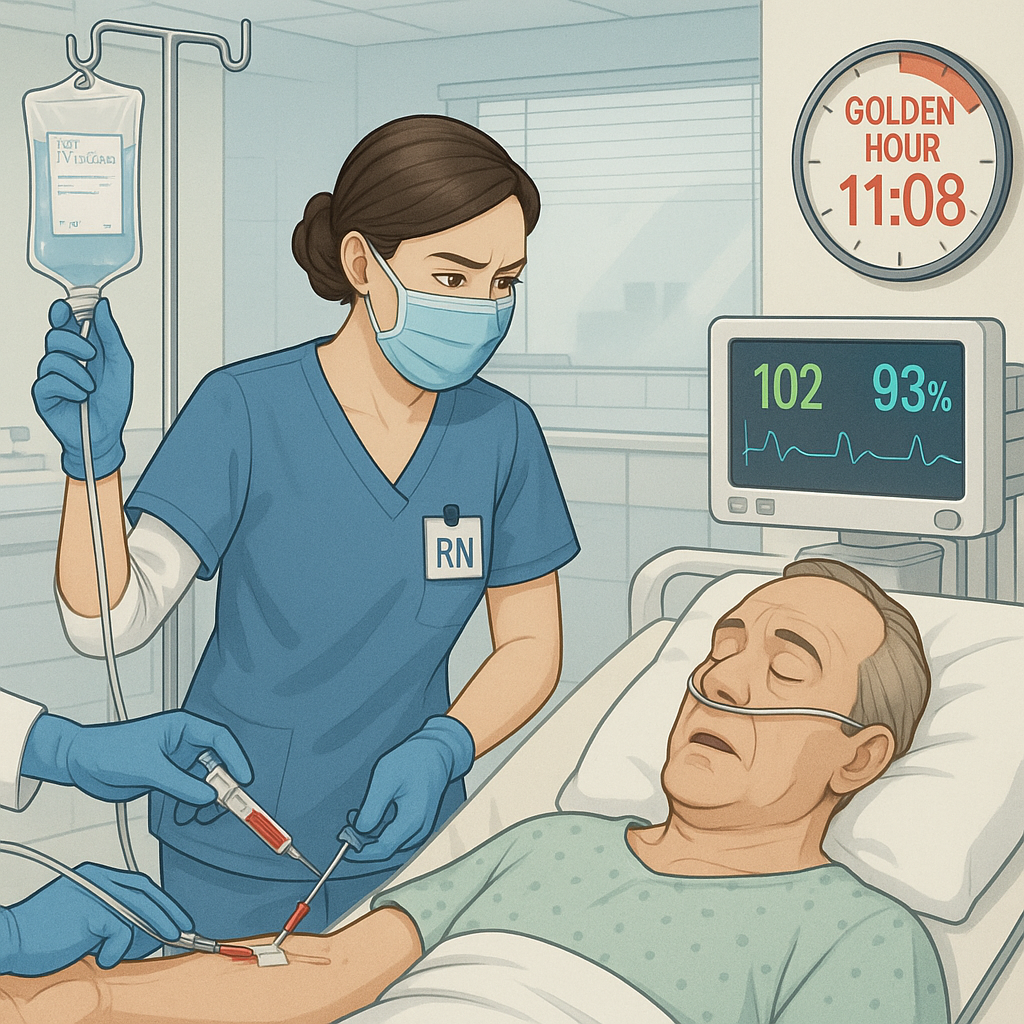Sepsis is a life-threatening medical emergency that every nurse must know how to manage. In fact, early recognition and treatment during the golden hour can literally save lives. Therefore, as a registered nurse (RN nurse) preparing for the NCLEX, understanding your critical role in sepsis management is essential. This guide will help you master the fundamentals and is a valuable addition to any nursing bundle for med-surg or critical care.
🚨 What Is Sepsis?
Sepsis is the body’s overwhelming and harmful response to infection, which can lead to organ dysfunction and, if untreated, septic shock and death. According to the CDC, sepsis kills nearly one in three patients who die in hospitals — a statistic that underscores the importance of prompt nursing care.
Common causes include:
✅ Pneumonia
✅ Urinary tract infections
✅ Abdominal infections
✅ Skin infections
In short, any untreated infection can spiral into sepsis if not identified early.
⏱️ What Is the Golden Hour?
The golden hour in sepsis refers to the first 60 minutes after identifying possible sepsis. During this time, rapid interventions dramatically improve survival. Moreover, as an RN nurse, knowing what to do within these critical minutes determines whether your patient recovers or deteriorates.
🩺 Nurse’s Role During the Golden Hour
Registered nurses are on the front lines of sepsis care. Consequently, they play a vital role in recognizing symptoms, starting interventions, and ensuring effective communication with the healthcare team.
Here’s what to prioritize step by step:
✅ Recognize Early Signs of Sepsis
Be alert for subtle changes such as:
- Altered mental status
- Elevated heart rate
- Low blood pressure
- Fever or hypothermia
- High respiratory rate
- Decreased urine output
In other words, if something feels “off” with your patient, act fast.
✅ Activate the Sepsis Protocol Immediately
Follow your hospital’s sepsis bundle and notify the provider STAT.
Furthermore, teamwork is essential — every minute counts in preventing organ failure.
✅ Get Blood Cultures and Lactate Levels
Always draw cultures before starting antibiotics.
Additionally, measure lactate levels to assess tissue perfusion.
✅ Administer Broad-Spectrum Antibiotics
The sooner, the better — ideally within the first hour.
Delaying antibiotics, even by 30 minutes, can lower survival chances.
✅ Start Fluid Resuscitation
Typically, give 30 mL/kg of crystalloids to support blood pressure and organ perfusion.
For example, normal saline or lactated Ringer’s are commonly used.
✅ Monitor Vitals Closely
Reassess every 5–15 minutes if unstable.
Meanwhile, watch for worsening hypotension, tachycardia, or hypoxia.
✅ Educate the Patient and Family
Explain what sepsis is and why aggressive treatment is necessary.
By doing so, you reduce anxiety and improve cooperation with care.
🔎 Key NCLEX Tips for Sepsis
As you prepare for the NCLEX, remember the following critical points:
- Always suspect sepsis if vital signs are abnormal and infection is known.
- Know the “Sepsis Six”: oxygen, cultures, antibiotics, fluids, lactate, urine output.
- Always draw cultures before antibiotics.
- Think ABCs + sepsis bundle for prioritization.
In addition, include sepsis-related questions in your nursing bundle to reinforce these vital steps.
🩹 Preventing Sepsis in Nursing Care
Prevention, not just treatment, is a major part of effective nursing practice.
Therefore, nurses should consistently:
✅ Practice excellent hand hygiene
✅ Use sterile technique for invasive devices
✅ Educate patients about infection prevention
✅ Remove catheters and lines once they’re no longer needed
✅ Encourage early mobilization and proper nutrition
As a result, these preventive measures drastically reduce infection risk and improve patient outcomes.
⚠️ Complications of Sepsis
Without fast intervention, sepsis can progress to:
- Septic shock (severe low blood pressure despite fluids)
- Multiple organ dysfunction syndrome (MODS)
- Death
Ultimately, your quick action as an RN nurse can prevent these life-threatening outcomes. However, even small delays can have serious consequences.
🧩 Add This to Your Nursing Bundle
To stay organized and confident during sepsis management, add the following to your nursing study toolkit:
✅ Sepsis recognition checklist
✅ Golden hour timeline
✅ Sepsis treatment flowchart
✅ ABC + Sepsis priority cheat sheet
Together, these tools make an excellent NCLEX and med-surg review resource.
📝 Quick Takeaways
💡 The golden hour saves lives — act immediately.
💡 Draw cultures before giving antibiotics.
💡 Fluids and antibiotics are first-line treatments.
💡 Early recognition is 100% a nurse’s responsibility.
💡 Prioritize teamwork and clear communication to ensure success.
In conclusion, mastering sepsis recognition and rapid response gives nurses the power to save lives daily. Therefore, review your sepsis bundle often, stay alert for subtle signs, and always act within the golden hour — because every minute matters.

